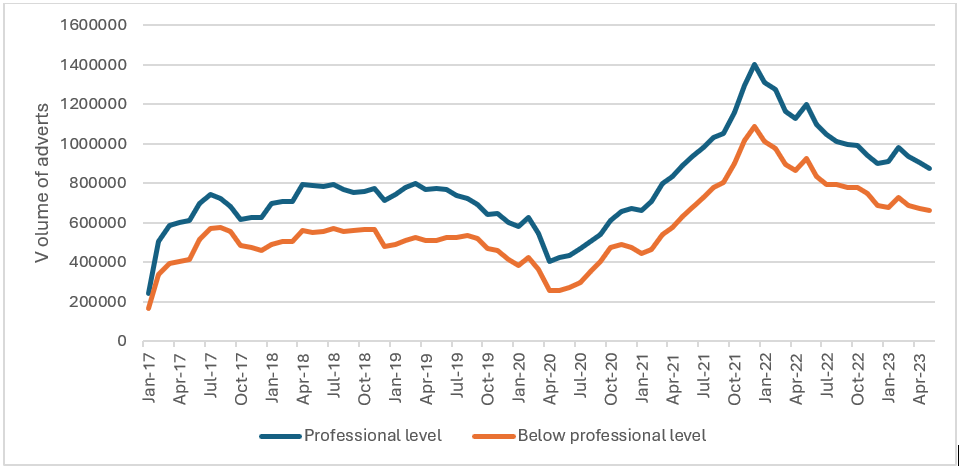As Easter approaches and we gear up for another summer of graduate recruitment, Charlie Ball from Prospects at Jisc takes a look at where the graduate labour market sits.
In general, the graduate labour market is still reasonably strong, but the heights of 2021/22 are now in the past as the backlog of recruitment caused by Covid has largely unwound.
The key feature is that much of the graduate labour market currently remains uncoupled from the wider economic picture.
Although the UK is, at the time of writing, in technical recession, the graduate labour market is not. Long-term skills shortages in many key areas mean that while this year’s recruitment round is likely to be a little less favourable to the candidate than the last couple of years, it’s still likely that it will be good by historic standards.
Detail
Recent data from the ONS looking at job demand since 2017 makes the situation stark. Since then, the majority of vacancies in the UK have been at professional level, and by April 2023, 57% of them were for degree or equivalent holders.
There is little subsequently to suggest that this pattern has changed in any significant way.

Vacancy data from the ONS from 2017 to 2023
The most recent summary from the Bank of England Agents, on March 21st, noted that:
“As in the last update, most firms are maintaining their current employment levels and the number of businesses reporting a reduction in head count remains low. Labour hoarding is still a common precaution against what is still perceived as tight labour market, by historical standards.
“Churn continues to decrease, reflecting uncertainty in the labour market and firms holding fewer vacancies. Recruitment difficulties continue to ease although some local labour markets and sectors such as engineering, software and manufacturing continue to struggle.”
Data shows that employers are currently very reluctant to lay off workers and to reduce recruitment plans. Many fear (probably correctly) that supply of skilled graduates in tech and business services, as well as those in health, education and social care, is likely to remain tight for the foreseeable future.
The most recent data from the Recruitment and Employment Confederation (REC) also shows a labour market that is stronger than the economy might suggest, but in line with other data is nevertheless weaker than this time last year. REC’s view is that this is a ‘soft landing’ for the labour market, and this seems the prevailing consensus.
What’s to come?
As 2024 progresses, we can most likely expect a gradual fall in overall vacancies, but not a dramatic one, and the jobs market in the next six months is likely to be more of the same that we have had in the early part of 2024.
For those expecting to graduate, it means that tech, finance and business services such as marketing and HR will remain reasonably buoyant, as well as health, education and social care. But there may be a tougher jobs market in the creative industries, which are still suffering from the legacy of Covid.
For employers, it means little respite is likely in difficult hiring situations such as tech – IT and engineering in particular – and a new graduating cohort that is unlikely to be big enough to fill existing gaps.
As inflation comes down, we may see salary rises that are more in line with the increased cost-of-living, so although the jobs market in the latter half of the year will likely look quite similar to the last few months, it will probably be stronger than current economic figures suggest.
You may also be interested in…
What’s going to happen in graduate employment in 2024?
ISE’s top three predictions for 2024
Robust yet competitive graduate labour market


0 Comments
Trackbacks/Pingbacks